Salesforce vs ServiceNow
Comparing the merits of Salesforce vs ServiceNow's CRM software platforms
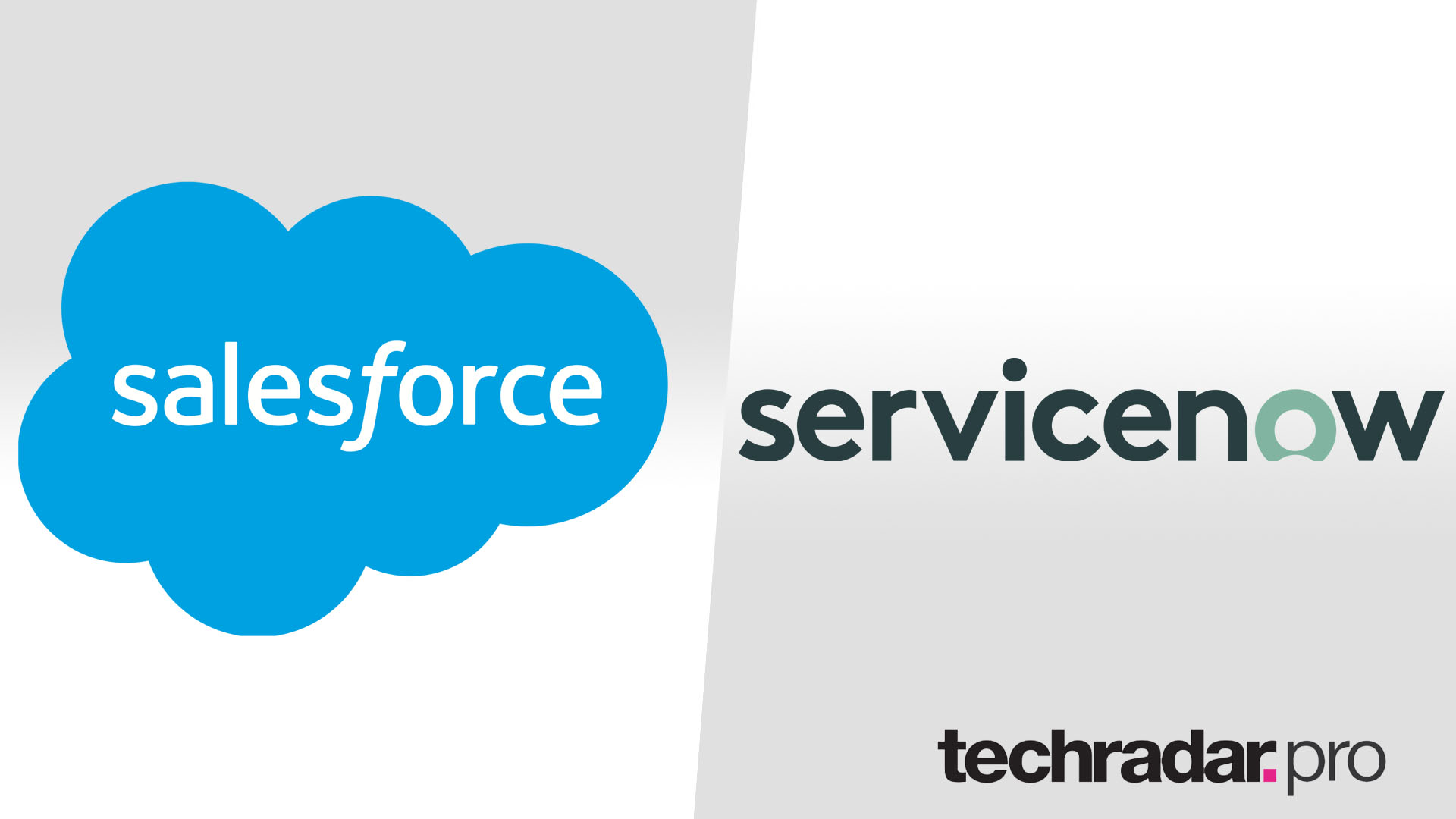
Sign up for breaking news, reviews, opinion, top tech deals, and more.
You are now subscribed
Your newsletter sign-up was successful
When it comes to contenders for the best CRM software, we compared Salesforce vs ServiceNow to see which comes out on top. In the analysis below, we've compared Salesforce against ServiceNow based on a shared set of metrics to determine an overall winner. We also reviewed use cases where each platform is most suitable.
Salesforce is a broad spectrum software as a service (SaaS) product offering, with a particular focus in the CRM space for customer service, sales, and marketing. It's one of the leading CRM providers, thanks to its broad product range and high level of customization, and you can find out more in our Salesforce Service Cloud review.
ServiceNow is cloud-based workflow management software with a focus on customer service, HR, and IT. It made our list of best asset management software thanks to its powerful analytics and impressive range of features.
In the comparison below, we'll also look at each platform’s product offering, compare each program’s AI-driven features, and review their ability to manage internal and customer-facing workflows. Finally, we'll compare product performance, including computing resource use, uptime, and implementation.
Get Salesforce from just $25 per user a month (US-only link)
Salesforce is the CRM software market leader for a number of very good reasons. Foremost are its comprehensive suite of CRM tools, as well as its excellent range of integration options, and its unrivalled levels of customization. Click the link below to find out more (US businesses only).
Salesforce vs ServiceNow: Features
Customer service workflow management
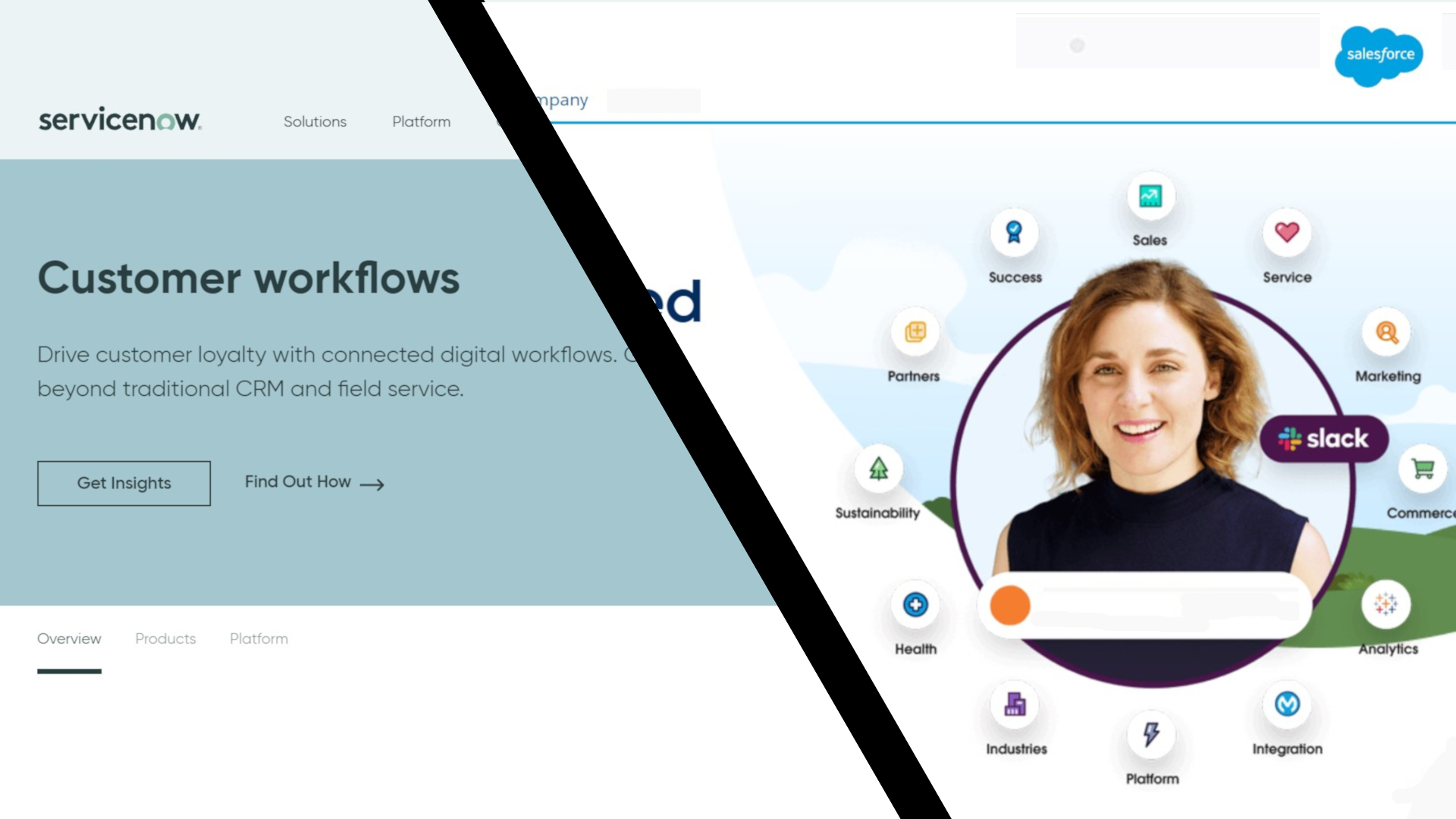
Salesforce offers a comprehensive customer service CRM product called Service Cloud. For a deep dive into this, read our guide outlining what Salesforce Service Cloud is. ServiceNow meanwhile offers a product suite called Customer Workflows, which has a similar combined feature set as Service Cloud.
Both platforms provide an AI-driven workflow system, which assigns cases to agents based on priority and expertise. Both also offer a comprehensive field service management solution, VoIP integration, multi-channel customer service, and automation of repetitive processes. Feature-for-feature, Customer Workflows and Service Cloud are almost identical.
Sign up for breaking news, reviews, opinion, top tech deals, and more.
It is worth noting that ServiceNow’s Customer Workflows have one feature, Financial Services Operations, that Service Cloud does not have. Financial Service Operations is a customer service solution for banks. Benefits include customer document management and payment processing.
Salesforce can accomplish the same thing with its specialized Financial Services Cloud product, but it must be purchased separately from Service Cloud.
Solutions for sales and marketing teams
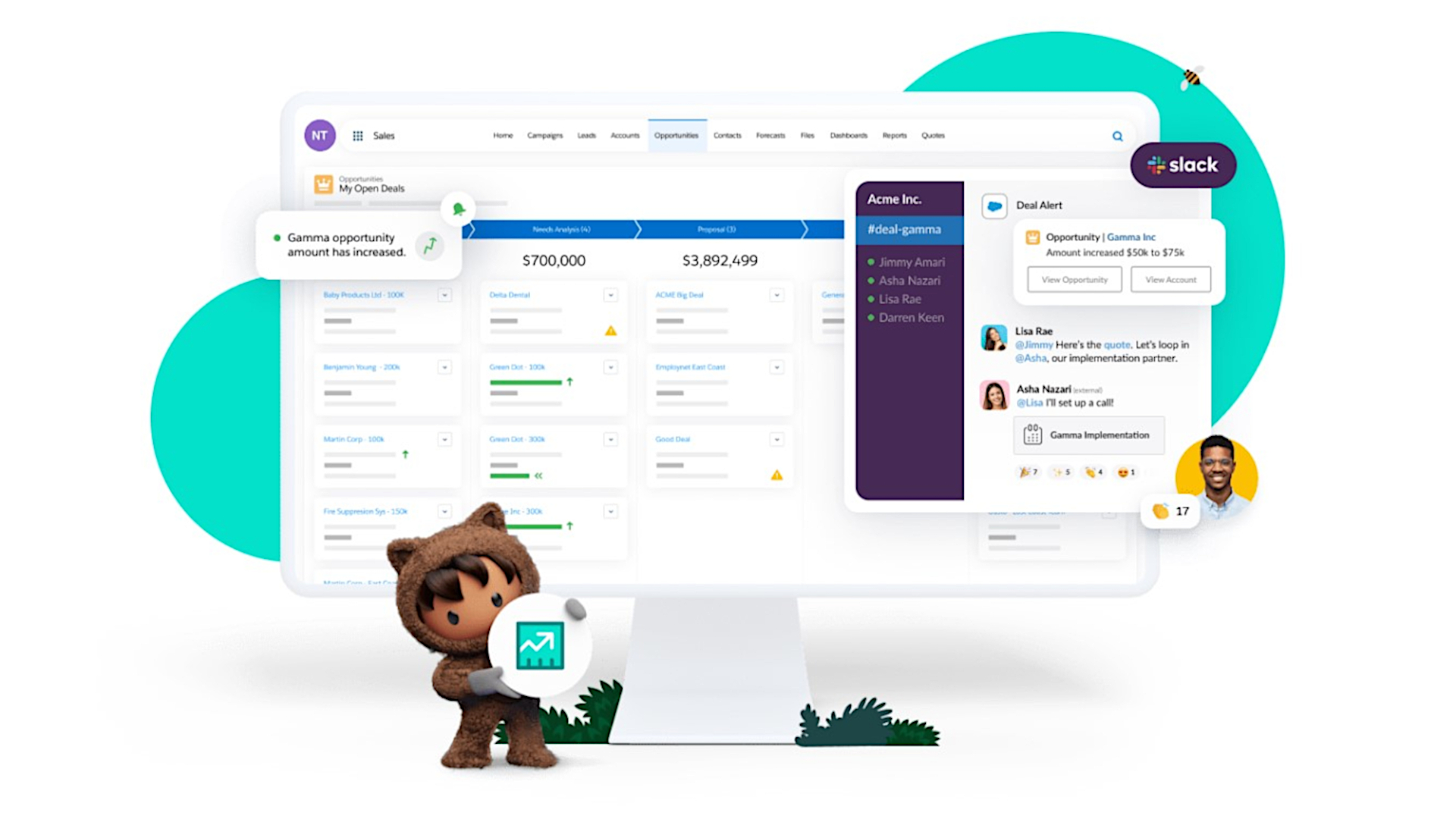
Salesforce wins out clearly in this category, with two CRM products available to serve sales and marketing teams, respectively—Sales Cloud and Marketing Cloud. ServiceNow does not offer a sales or marketing platform, and cannot compete with Salesforce in this space.
Sales Cloud provides pipeline management, a lead database, and AI-driven lead qualifying. Marketing Cloud enables you to automate marketing campaigns and segment and analyze your leads.
Furthermore, both Sales Cloud and Marketing Cloud provide analytics data. Additional business analytics can be conducted with Tableau, an analytics platform provided by Salesforce. You can use this software to analyze and derive insights from your entire Salesforce database, including your customers from Service Cloud. You can learn how to set up Salesforce with Tableau should you choose Salesforce.
Internal workflow management — IT and HR
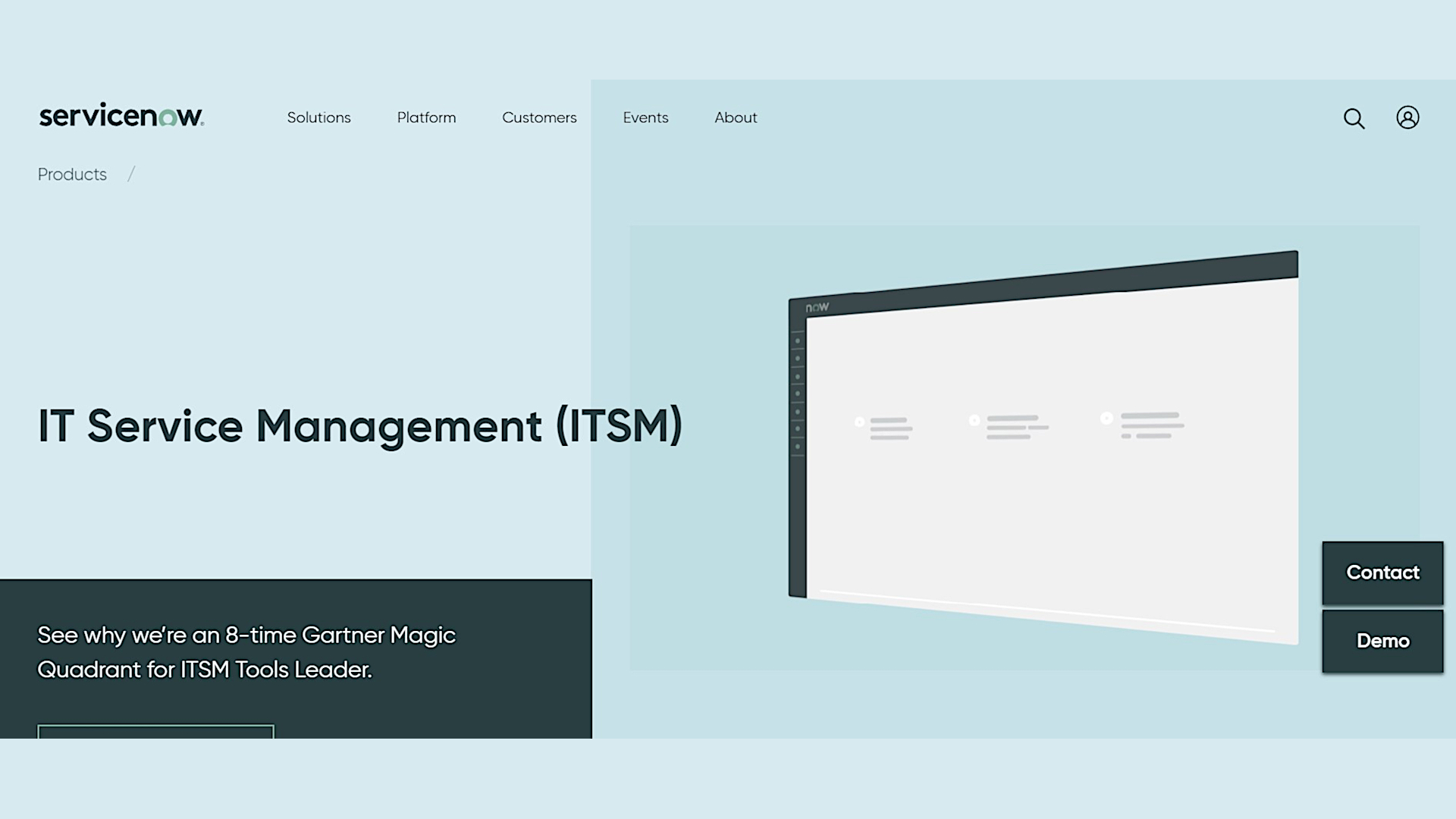
ServiceNow has two suites of products dedicated to IT and employee workflow management, IT Workflows and Employee Workflows, and is the clear winner in this category. Salesforce lacks a dedicated program for this purpose, although Service Cloud ticketing can be adapted for internal employee use.
IT Workflows goes far beyond a simple ticketing system. You can use it to run automated operations that attempt to predict errors before they occur, help manage IT infrastructure investments, and ensure that your IT projects continue to align with your business objectives.
Employee Workflows is designed to improve organizational agility and raise morale among employees, and ServiceNow claims it can increase retention by as much as 34%. It goes further than just HR, providing a platform for employees to interact with IT, HR, legal, and more.
AI-driven features
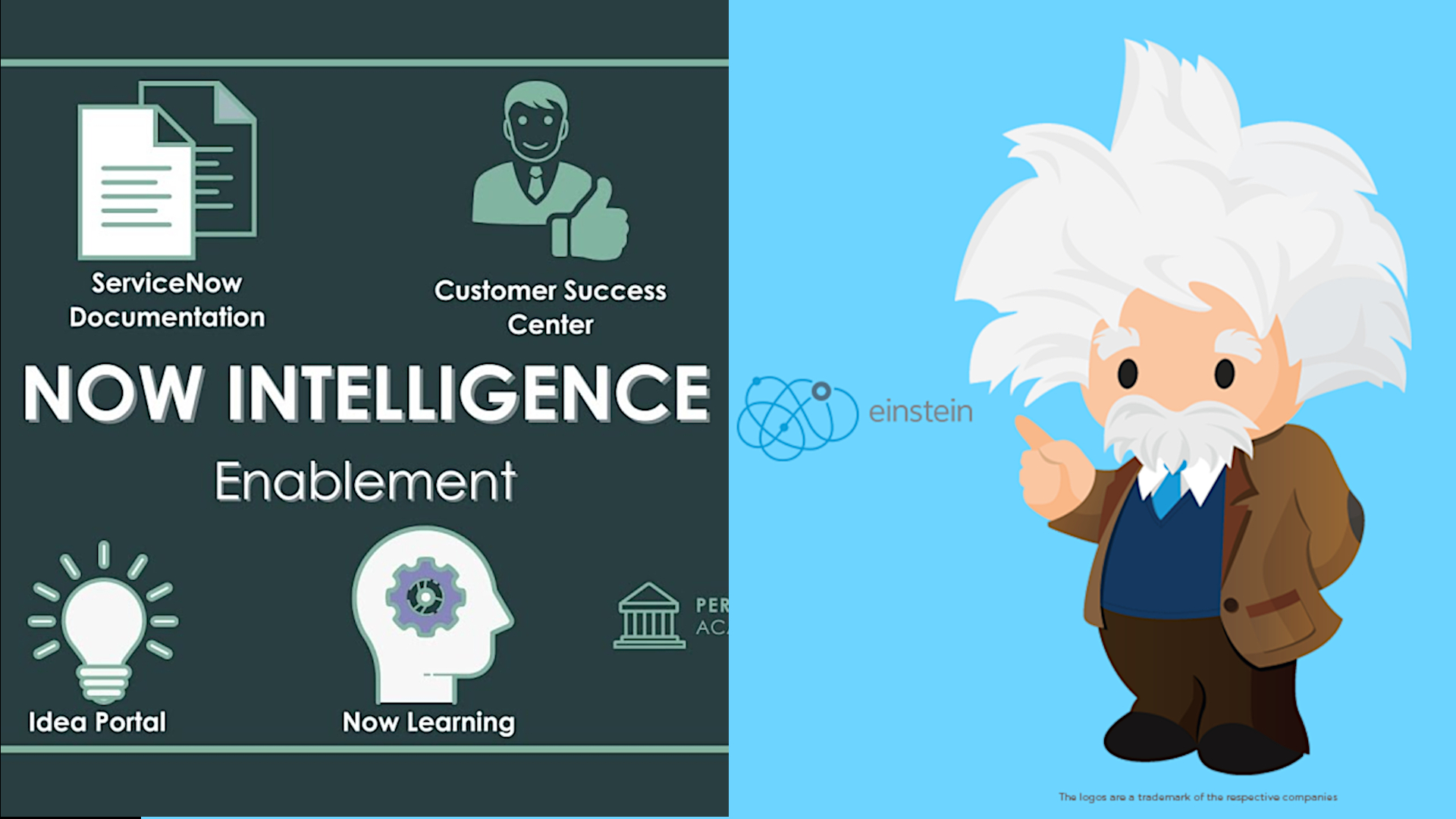
Salesforce has an AI platform called Einstein AI. It works across all Salesforce products to reduce inefficiencies, automate processes, and provide predictive analytics.
ServiceNow’s Now Intelligence AI platform functions similarly to Einstein AI. On the customer-facing side, it assists customers by providing relevant knowledge-based articles for self-service support, and intelligently allocating customer tickets to the correct experts.
Now Intelligence does the same for employee-side tickets. It also assists with process automation, and attempts to automatically predict service and IT issues before they occur with predictive analytics.
Einstein AI has some features that Now Intelligence does not—specifically, its assistance to the sales and marketing side of your business in qualifying leads, and in predicting the success of sales and marketing campaigns. However, this is not because of a shortcoming with Now Intelligence. ServiceNow simply does not operate in the sales and marketing space.
Salesforce vs ServiceNow: Performance
Use of computing resources
It is important to note that both Salesforce and ServiceNow are SaaS providers. Their products are provided directly to you through the cloud, with minimal local storage required. The strain on your local infrastructure is minimized with either provider, as Salesforce and ServiceNow’s servers do all the heavy lifting.
Therefore, the only client-side technical requirement that matters is bandwidth. Every user accessing the cloud needs to download the information they are accessing, and upload any changes they make during their session.
Both platforms are aware of this, and designed systems to use as little bandwidth as possible, so that customers can take advantage of their services regardless of the quality of their internet connection.
Actual bandwidth usage can be difficult to estimate, but ServiceNow states that its largest clients use less than 100Mbps of network bandwidth at peak network utilization. Salesforce states that its average page uses about 90KB of bandwidth, with the average user browsing 120 pages a day.
That works out to be a daily usage of about 10MB daily per user, or 0.000925926Mbps per user. To hit the 100Mbps mark with ServiceNow, you would need to have an average of 100,000 users. In practice, you would have fewer because some users at the administrator level would use up considerably more bandwidth.
100Mbps is very little for an organization with tens of thousands of users. Therefore, both programs are well designed with negligible network usage.
Uptime
While cloud providers are generally good at maintaining uptime, downtime for ServiceNow or Salesforce can have consequences that range from the unpleasant to the catastrophic, depending on the length of the downtime and your organization’s dependence on that particular system.
Imagine having your customer service database go down during working hours, or having an IT crisis while simultaneously being unable to process IT tickets because the system that handles those tickets is down. These types of issues can arise with either Salesforce or ServiceNow, and are an unfortunate business risk that is not entirely avoidable.
According to the Salesforce Master Subscription Agreement, they will “use commercially reasonable efforts to make the online Services available 24 hours a day, 7 days a week”. Salesforce also boasts an uptime of 99.9%. While this sounds impressive, it does imply an average downtime of about 8 hours and 46 minutes a year.
ServiceNow promises 99.8% uptime, which implies an average downtime of 17 hours and 30 minutes. Downtime that exceeds this value can be billed to ServiceNow and refunded from your next invoice. Given that Salesforce subscribes to a more stringent uptime guarantee, it's the winner in this category.
Implementation
Depending on your team’s technical knowledge, the number of products you have, and the amount of customization you need, implementing Salesforce can take weeks or months. The average Salesforce implementation time is between three and four weeks.
ServiceNow has a significantly longer implementation time, and a product offering with minimal customization will take about four months to implement. Therefore, Salesforce wins here.
Salesforce vs ServiceNow: Support

Salesforce has three tiers of customer support. The standard level of support consists of Salesforce Trailhead and the Trailblazer community. Users can also submit technical support tickets to Salesforce, which have a two-day turnaround time.
Customers who need a higher level of support can upgrade to the Premier tier to unlock 24/7 live phone support. This costs an extra 30% of your total Salesforce subscription price. The Enterprise support tier is one level above Premier, and unlocks proactive support and access to a dedicated account representative. Pricing for the Enterprise tier is available on request.
ServiceNow provides 24/7 phone support to all customers, with numbers available by country on its Contact Support page. You can also contact the ServiceNow team directly through the online chat on its website, or access the self-service knowledge base, Now Support. You can also use Now Support to speak with a subject matter expert, but the expected turnaround time is six hours.
Since ServiceNow’s support essentially provides the same thing as Salesforce’s premier support for free, we consider it the superior option for budget-sensitive users. Large-sized enterprises, however, might prefer the proactive support and dedicated account representative offered in Salesforce’s enterprise tier despite the added cost.
Salesforce vs ServiceNow: Pricing and plans
Salesforce offers over 14 products, each with four pricing tiers. Pricing is disclosed on the Salesforce website for each product, with the lowest pricing tiers starting at $25 per user a month.
ServiceNow products have a narrower scope compared to the ones that Salesforce offers. For example, to unlock the equivalent of Salesforce Service Cloud in ServiceNow, you would need to subscribe to Customer Service Management, Field Service Management, and Telecommunications Service Management, all located under the Customer Workflows product umbrella.
Pricing for ServiceNow products is not publicly disclosed, with the website instead inviting you to submit a form to receive a personalized quote. According to ScienceSoft, an official ServiceNow partner, the complexity of the ServiceNow product precludes a set price for all users.
Instead, ServiceNow uses a complex matrix involving company size, industry and region, and products, packages, and licenses to determine your final subscription amount.
According to ScienceSoft, a 200-person healthcare consulting company in the Middle East should expect an IT Service Management software package to cost around $30,000 a year. A 15,000-person advertising company in the US should expect about $55,000 a year for the same package.
Considering that both Salesforce and ServiceNow have a similar level of complexity, we appreciate Salesforce’s transparency when it comes to pricing. For that reason, we consider Salesforce to be the winner in this category.
| Header Cell - Column 0 | Salesforce Service Cloud | Salesforce Sales Cloud | Salesforce Success Customer Support |
|---|---|---|---|
| Essentials | $300 per user | $300 per user | Free |
| Professional | $900 per user | $900 per user | 30% of license price |
| Enterprise | $1,800 per user | $1,800 per user | Available on request |
| Unlimited | $3,600 per user | $3,600 per user | - |
Salesforce vs ServiceNow: Verdict
So which is better, Salesforce or ServiceNow? Having reviewed both systems head-to-head on a number of metrics, we found it to be a close call. But we have to award the win to Salesforce by a close margin.
Both products have a very similar feature set. But while Salesforce can do many things that ServiceNow cannot do, there is nothing you can do with ServiceNow that you can’t accomplish in some fashion with a Salesforce product.
Salesforce also has a slight edge in performance, with 99.9% uptime rather than 99.8%, which translates to almost nine extra hours of uptime a year. More importantly, Salesforce has a much shorter minimum implementation time at three to four weeks, compared to ServiceNow’s four months.
We also gave the edge to Salesforce when it comes to pricing, simply because ServiceNow does not disclose its pricing publicly. It is nearly impossible to gauge what its typical price range is. This is not meant to imply that Salesforce is cheaper—we simply cannot determine that information due to ServiceNow’s pricing policy.
The only area where ServiceNow outshines Salesforce is customer service, as it offers 24/7 phone support for free, while Salesforce charges an extra 30% on top of your subscription.
Overall, based on our analysis, Salesforce is the winner when compared against ServiceNow.
Next steps with CRM software and Salesforce
If you're new to the world of Salesforce, it's worth establishing what Salesforce is, as well as looking into what its offshoot services do, such as what Salesforce Lightning is and how it works. Comparing Salesforce vs Zoho, another leading CRM, may help crystallize your decision on whether to invest in it.
Should you choose to go with Salesforce, it's best to establish how to learn Salesforce and improve your skills. Once it's up and running, find out how to set up Slack to Salesforce integration and how to set up Salesforce with Tableau, just two steps towards getting to grips with the platform's many integrations and optimizations.
Serguei holds degrees in finance and marketing from York University, and brings more than five years of professional experience at their intersection to his writing. His previous roles as a finance advisor involved breaking down and explaining complex concepts in everyday terms, a talent he now brings to his work as a freelance writer.
